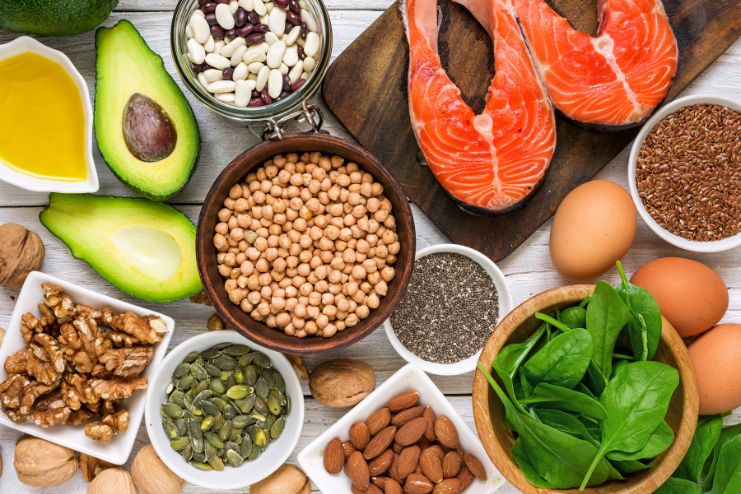Affiliate Disclaimer
Some links in this article are affiliate links. We may earn a small commission if you make a purchase through these links, at no extra cost to you. We only recommend products we find useful to our readersDid you know that the food we eat has a big impact on our mental health? Research shows that our diet plays a major role in how anxious or calm we feel, thanks to the close connection between our gut and brain—what scientists call the gut-brain axis.
Some foods can actually lower stress, help us feel relaxed, and support the brain’s natural chemicals that make us feel good. On the flip side, some foods can ramp up anxiety. So, by paying attention to what we eat, we can make smarter choices that help keep our minds a little more at ease.
In this article, we’ll discover the best foods for anxiety relief, which promote relaxation and support brain chemicals like serotonin. You’ll also learn about foods to avoid, which can trigger anxiety. We’ll dive into how nutritional supplements can offer additional support for those who need it. Plus, we’ve got lifestyle tips to help you stay on track with an anti-anxiety diet, showing how simple changes can improve both your mental and physical health.
How Diet Affects Anxiety
Diet plays a significant role in mental health and anxiety levels, with a poor diet potentially exacerbating mood disorders and a healthy diet promoting better well-being. Specifically, focusing on nutrient-rich foods, limiting processed foods, and addressing gut health can positively impact mental health.
The Role of the Gut Microbiome in Mental Health
The gut is often called the “second brain” because of its strong link to the nervous system. This connection is known as the gut-brain axis, and it’s more powerful than you might think.
A healthy gut microbiome helps produce important neurotransmitters like serotonin and GABA, which are crucial for regulating mood, stress, and anxiety. When your gut bacteria are balanced, your brain benefits, helping you feel calmer and more emotionally stable.
However, when there’s an imbalance in your gut, it can lead to increased anxiety, stress, and even mood disorders. Taking care of your gut health through diet and lifestyle choices can positively impact your mental well-being, showing just how connected our gut and brain really are. So, it’s not just about digestion—your gut plays a key role in keeping your mind healthy too.
Blood Sugar Fluctuations and Mood
Unstable blood sugar levels can have a big impact on your mood, leading to irritability, stress, and even anxiety. When you consume refined carbs or sugary foods, your blood sugar spikes quickly but then crashes, which often triggers mood swings and a heightened stress response. This is especially important for people with diabetes, where blood sugar fluctuations can significantly affect mental and physical health.
Here’s how it works: high blood sugar (hyperglycemia) can make you feel angry, sad, and irritable, while low blood sugar (hypoglycemia) can cause nervousness, anxiety, and confusion. Constantly bouncing between high and low blood sugar—what’s called glycemic variability—can make you feel like you’re on an emotional rollercoaster.
Poorly controlled blood sugar is also linked to a higher risk of anxiety and depression, especially for those managing diabetes. Stress, lack of sleep, and certain medications can make these fluctuations even worse, adding more fuel to the fire when it comes to mood changes. Taking control of blood sugar through diet and lifestyle choices can help you feel more emotionally balanced and calm.
READ MORE: How Your Diet Impacts Diabetes
Essential Nutrients for Neurotransmitter Balance
Maintaining balanced neurotransmitter function is key to supporting your mood, motivation, and overall mental well-being. Certain nutrients play a big role in keeping those brain chemicals in check. Here’s a breakdown of some essential nutrients for neurotransmitter balance:
- Serotonin: This mood-regulating neurotransmitter is influenced by tryptophan, an amino acid found in foods like turkey, chicken, fish, eggs, and nuts. Serotonin helps regulate mood, sleep, and appetite.
- GABA: Known for its calming effects, GABA is supported by magnesium (found in leafy greens, nuts, and seeds) and probiotics, which promote gut health and neurotransmitter balance.
- Dopamine: Associated with pleasure and motivation, dopamine is supported by omega-3 fatty acids (in fatty fish, flaxseeds, and chia seeds) and B vitamins (found in meat, poultry, fish, and eggs).
For overall neurotransmitter health, you’ll also want to include choline (eggs, meat), B vitamins (especially B6, B12, and folate), vitamin C (citrus fruits, berries), zinc (meat, seeds), iron (spinach, red meat), and vitamin D (sun exposure, fortified foods). A well-rounded diet rich in these nutrients can help support your brain, improve mood, and keep stress in check.
Best Foods to Eat for Anxiety Relief

If you’re looking to ease anxiety, focusing on certain foods can make a huge difference in stabilizing your mood and supporting brain health. Here are some key food groups to include in your diet:
- Omega-3 Rich Foods: Fatty fish like salmon, sardines, and mackerel, along with flaxseeds and walnuts, are fantastic sources of omega-3s. These healthy fats reduce inflammation, support brain function, and promote mood stability.
- Probiotic & Prebiotic Foods: Fermented foods like yogurt, kimchi, and sauerkraut enhance gut health, boosting serotonin production and reducing stress.
- Magnesium-rich Foods: Dark chocolate, leafy greens (like spinach and kale), and almonds are packed with magnesium, which helps relax muscles and regulate stress hormones such as cortisol, reducing anxiety.
- Complex Carbohydrates: Quinoa, oats, and sweet potatoes provide a steady release of energy, stabilizing blood sugar and promoting serotonin release, keeping your mood balanced.
- Tryptophan-Rich Foods: Foods like turkey, eggs, and cheese are rich in tryptophan, a precursor to serotonin, which promotes relaxation and stress relief.
- Herbs & Adaptogens: Natural remedies like ashwagandha, chamomile, and green tea can help reduce cortisol levels and support adrenal health, which can further ease anxiety.
- Protein: Protein helps produce neurotransmitters like serotonin and dopamine, which support mood and reduce anxiety. Certain sources, like whey, may also lower cortisol, the stress hormone. Opting for plant-based proteins over excessive animal protein can further support mental well-being.
To help reduce anxiety, aim for a diet filled with omega-3 fatty acids, complex carbs, magnesium-rich foods, and antioxidant-packed fruits and veggies. Don’t forget to limit processed foods and caffeine, which can aggravate stress.
READ MORE: From Caffeine to Chamomile: Drinks That Boost Energy and Calm Anxiety
Foods to Avoid for Better Mental Health
Caffeine, sugar, alcohol, and processed foods can all have a big impact on anxiety and mental well-being. While some foods can calm the mind, others might worsen symptoms by spiking stress hormones, creating mood swings, or disrupting neurotransmitter function. Here’s a breakdown of the types of foods to avoid if you’re trying to manage anxiety:
- Caffeine & Stimulants: Too much caffeine boosts cortisol levels, the body’s stress hormone, leading to anxiety, jitteriness, and difficulty relaxing.
- Processed Sugar & Refined Carbs: These cause rapid blood sugar spikes and crashes, leading to mood swings and irritability, which can aggravate stress.
- Alcohol & Artificial Sweeteners: Alcohol can disrupt brain chemistry, while artificial sweeteners like aspartame can affect mood by altering neurotransmitter activity.
- Trans Fats & Ultra-Processed Foods: Trans fats and ultra-processed foods, like fast food and fried snacks, can cause inflammation, negatively affecting brain function and worsening anxiety.
These foods increase inflammation in the body, impair brain function, and may worsen anxiety over time. Regular consumption of these foods may impair mood stability and increase stress.
READ MORE: 18 Ways to Boost and Improve Mental Health for a Better Life
Nutritional Supplements for Anxiety (If Needed)

If you’re not getting enough key nutrients through food, certain supplements can be a helpful addition to support mental well-being and manage anxiety. However, before starting any new supplement routine, it’s essential to consult with a healthcare professional to ensure safety and efficacy.
Here’s a more detailed look at some supplements that may help with anxiety:
- Omega-3 Supplements: Omega-3 fatty acids, especially EPA and DHA found in fish oil, are critical for brain health. These fats can help reduce inflammation and improve mood stability, which may ease anxiety symptoms.
- Magnesium Glycinate: Magnesium is a mineral that plays a key role in relaxation and stress management. Magnesium glycinate, in particular, is gentle on the stomach and effective at promoting calmness, improving sleep quality, and alleviating anxiety.
- L-theanine: A compound found naturally in green tea, L-theanine is known for its ability to promote relaxation without causing drowsiness. It can help reduce stress levels and enhance focus, making it a great natural option for those experiencing anxiety.
- Vitamin D: Low levels of vitamin D have been linked to mood disorders, including anxiety. Especially in winter or for those with limited sun exposure, vitamin D supplements may support better mood regulation and help reduce anxiety symptoms.
- B-Complex Vitamins: B vitamins, particularly B6, B9 (folate), and B12, are vital for maintaining a healthy nervous system. Deficiencies in these vitamins can lead to increased stress and anxiety, so supplementing may improve mood stability and brain function.
Herbal Supplements
- Chamomile: This popular herbal remedy has been used for centuries for its calming properties. Chamomile supplements or teas may help reduce anxiety and promote better sleep, making it easier to manage stress.
- Valerian Root: Traditionally used to promote relaxation and ease insomnia, valerian root is another natural supplement known for its anxiety-relieving effects. It may help reduce feelings of nervousness and tension.
- Ashwagandha: An adaptogen, ashwagandha helps the body manage stress and reduces anxiety by lowering cortisol levels. It’s widely used to promote mental clarity and improve overall stress resilience.
- Lavender: Known for its soothing scent, lavender also has properties that can reduce anxiety when taken as a supplement or used in aromatherapy. It can promote relaxation and improve sleep quality.
By incorporating these supplements into your routine—while maintaining a balanced diet and consulting with your doctor—you can help support your mental health and manage anxiety more effectively.
Sample Anti-Anxiety Meal Plan

Feeling anxious can take a toll on both your mind and body, but making mindful choices about what you eat can truly make a difference. Here’s a simple, delicious meal plan designed to nourish your brain and promote calmness throughout the day:
- Breakfast: Start the day with a warm bowl of oatmeal topped with walnuts and fresh berries. Oats give you a slow release of energy, helping to avoid any blood sugar spikes that can lead to mood swings. Walnuts bring in those brain-loving omega-3s, and the berries add a refreshing boost of antioxidants, which help protect against oxidative stress.
- Lunch: For lunch, go for grilled salmon paired with quinoa and steamed vegetables. Salmon is rich in omega-3 fatty acids that support brain health and mood stability, while quinoa offers complex carbs to keep your energy levels steady. Steamed veggies like broccoli or spinach add essential nutrients like magnesium and vitamins to keep your nervous system in check.
- Afternoon Snack: In the afternoon, treat yourself to some Greek yogurt mixed with flaxseeds and a drizzle of honey. Greek yogurt provides probiotics to support gut health (which directly impacts mood), while flaxseeds add more omega-3s and fiber. The touch of honey gives a natural sweetness without causing a sugar crash.
- Dinner: End your day with a comforting stir-fry of tofu, brown rice, and leafy greens like kale or spinach. Tofu is a great source of plant-based protein and contains tryptophan, which can help boost serotonin levels for a relaxed mood. Leafy greens are loaded with magnesium, known for their stress-relieving properties, and brown rice offers steady energy while being gentle on digestion.
- Before Bed: To wind down, sip on a calming cup of chamomile or green tea. Chamomile helps relax the nervous system and prepare you for a good night’s sleep, while green tea contains L-theanine, an amino acid that promotes relaxation without making you drowsy.
This meal plan is packed with mood-enhancing nutrients like omega-3s, magnesium, and probiotics, all carefully chosen to help you feel more balanced and less anxious throughout your day.
Diet Tips to Manage Mood and Blood Sugar
Your diet plays a vital role in stabilizing your mood and regulating blood sugar levels. The foods you choose, how often you eat, and even your hydration status can all impact both your emotional well-being and blood sugar balance. Below are some practical dietary tips to help keep your mood steady and your blood sugar in check:
- Monitor Your Blood Sugar: Tracking your blood sugar levels can reveal patterns and help you understand how your glucose levels influence your mood. Regular monitoring can empower you to make adjustments to keep your emotions and blood sugar stable.
- Eat a Balanced Diet: Focus on a well-rounded diet that includes healthy proteins, fats, and fiber-rich carbohydrates. Avoid refined sugars and processed carbs that can lead to blood sugar spikes and crashes, which often trigger mood swings and irritability.
- Seek Professional Help: If you’re noticing extreme mood swings or mental health issues related to blood sugar, don’t hesitate to reach out to a doctor or mental health professional for support.
- Practice Mindful Eating: Slow down and savor your meals. When you eat mindfully, you’re not only more aware of what you’re consuming, but it also aids digestion and lowers stress levels. It’s all about being present with each bite, appreciating the flavors, and listening to your body’s hunger and fullness signals.
- Hydration: Don’t underestimate the power of staying hydrated! Even mild dehydration can lead to irritability and crankiness. Make sure you’re drinking enough water throughout the day—it’s a small habit that supports your overall mental health.
Lifestyle Tips to Support an Anti-Anxiety Diet
Supporting an anti-anxiety diet goes beyond just what you eat—it’s about your whole lifestyle. Here are some simple yet impactful tips to help boost the benefits of an anxiety-friendly diet:
- Exercise: Regular exercise reduces anxiety by boosting mood-enhancing hormones like endorphins and serotonin, while regulating stress hormones like cortisol.
- Get Good Quality Sleep: Getting enough sleep (ideally 7-9 hours) gives your brain the time it needs to recharge and regulate emotions.
- Manage Stress: Chronic stress can throw your blood sugar (and mood) out of whack, so find ways to manage it—whether it’s through meditation, yoga, or simply taking a few deep breaths when things get tough.
- Incorporate Stress-Reducing Habits: Incorporate stress-relief techniques like meditation, deep breathing, or journaling into your daily routine. These practices can work hand in hand with your diet to help calm your mind and body.
- Spend Time Outdoors & Connect with Others: Spending time in nature or connecting with friends and loved ones can help ground you, lifting your mood and easing anxiety. Even just a short walk outside or a chat with a friend can make a huge difference.
- Engage in Activities You Enjoy: Make time for things you love! Whether it’s a hobby, reading, or a creative project, engaging in activities that bring you joy can help take your mind off stress and bring balance to your day.
- Seek Professional Help When Needed: If anxiety is getting in the way of daily life, remember that it’s okay to seek support from a therapist or counselor. Professional guidance can be an important piece of the puzzle in managing anxiety.
These lifestyle tweaks, when paired with a nutritious, anti-anxiety diet, can go a long way in supporting your overall mental well-being.
Conclusion
Incorporating an anti-anxiety diet into your daily routine is about making mindful, nourishing choices that support both your physical and mental health. The right foods—rich in omega-3s, magnesium, complex carbs, and antioxidants—can do wonders for your mood and overall well-being. Pairing these with simple lifestyle habits, like staying hydrated, moving your body, and getting enough sleep, can make a big difference in how you manage stress and anxiety.
It’s not about perfection or overhauling your entire routine overnight. Small, consistent changes add up, and before you know it, you’ll feel more balanced and in control. Remember, managing anxiety is a holistic process—nourishing your body, mind, and spirit in ways that feel good to you.
And while these dietary and lifestyle tips can be a great foundation, don’t hesitate to seek professional help if your anxiety feels overwhelming. A well-rounded approach that combines self-care, nutrition, and guidance from experts can lead to long-term relief and a happier, calmer you.
References
- https://www.sciencedirect.com/science/article/pii/S0924977X19317237
- https://www.medicalnewstoday.com/articles/317458
- https://www.mcleanhospital.org/essential/nutrition
- https://deannaminich.com/eating-for-your-neurotransmitters/
- https://www.medicalnewstoday.com/articles/322652
- https://www.healthline.com/health/depression/healthy-eating
- https://www.jeffersonhealth.org/your-health/living-well/8-supplements-that-can-help-reduce-anxiety-according-to-a-psych
- https://www.mayoclinic.org/diseases-conditions/generalized-anxiety-disorder/expert-answers/coping-with-anxiety/faq-20057987
In this Article



















